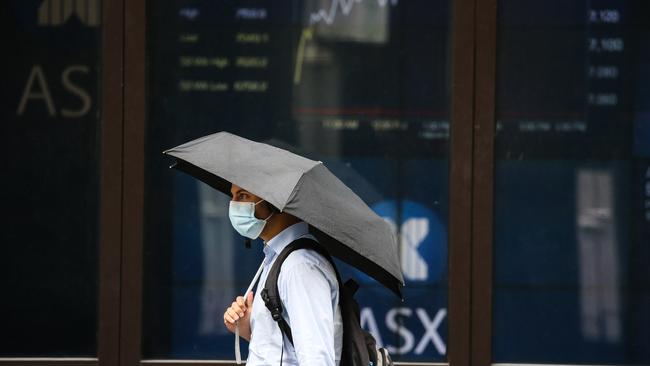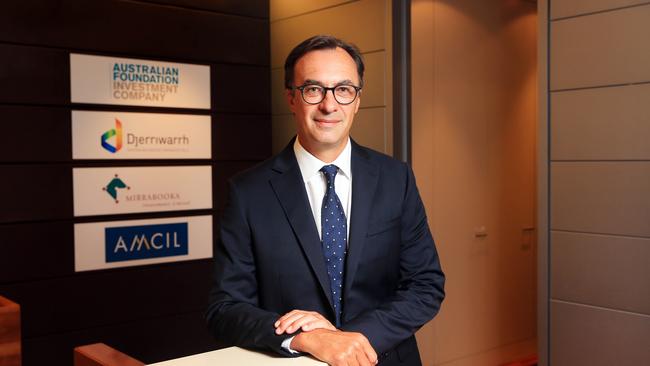Inflation, interest rates jitters wipe $50bn from the Aussie sharemarket
Investors are bracing for further volatility after a global rout wiped $50bn from the value of the ASX200 on Friday.

Australian investors are in the grip of a global sharemarket rout stretching from New York to Hong Kong that wiped around $50bn from the benchmark S&P/ASX200 Index on Friday, as the twin spectres of soaring inflation and tightening interest rates crushes share prices.
Technology stocks both locally and on Wall Street were especially singled out for heavier punishment by jittery investors, who are now viewing these companies with their scarce profits, lofty ambitions and sky-high valuations with growing scepticism.
And there could be little relief from volatility come next week, as the market braces for Wall Street opening overnight where blue chips, industrials and high-flying technology stocks alike have been sold down heavily over the last few days in the wake of tectonic shifts in economic and monetary settings.
On Friday there were broad falls across the Australian sharemarket with the benchmark S&P/ASX 200 Index falling 159.1 points, or 2.2 per cent, to close at 7205.6 points — a two-month low. The Australian market is down 3.1 per cent for the week, marking the third consecutive weekly loss and also the worst week since October 2020 which saw 3.9 per cent loss.
The slide torched around $50bn worth of shares held by investors on the S&P/ASX 200 Index, led by falls in the key Info Tech Index, down 4.5 per cent, Real Estate Index, down 3.37 per cent and Financials, down 1.99 per cent.
Among heavyweight stocks Macquarie Bank was the biggest drag as its shares fell almost 8 per cent to strip just over 19 points from the S&P/ASX 200 Index. It was followed by other large companies like CSL, BHP, Commonwealth Bank, NAB, Goodman Group and Transurban that were the cause of much of the points pain.
Around the region, Japan’s Nikkei 225 rose 0.7 per cent, but the Hang Seng dropped 3.8 per cent while the Shanghai Composite shed 2.2 per cent.
The nerves on Australian markets, as well as across the Asia Pacific and Europe, were kickstarted by Wall Street stocks suffering bruising losses Thursday in a broadbased sell-off prompted by unease over shifting monetary policy and rising economic risks from inflation.
The Dow Jones Industrial Average plunged more than 1,000 points, or 3.1 per cent, to 32,997.97, its worst day since June 2020.
The benchmark S&P 500 slid 3.6 per cent to 4,146.87, while the tech-rich Nasdaq Composite Index was hit even worse and tumbled 5 per cent to 12,317.69.
The losses were a dramatic reversal from Wednesday, when stocks rallied after the Federal Reserve announced a half-point interest rate increase as expected, but ruled out a three-quarter point increase.
While Wednesday’s outcome was not as hawkish as feared, the Fed’s announcement still embodies “one of the most aggressive tightening cycles that we have seen in decades,” said Angelo Kourkafas, investment strategist at Edward Jones.
“It didn’t necessarily change the narrative that economic growth is slowing, while the Fed will tighten monetary policy at the at the fast pace,” Mr Kourkafas said.
All 11 sectors of the S&P 500 were in the red, with several of the biggest US corporations experiencing hefty pullbacks. This included Amazon, down 7.6 per cent, Tesla, down 8.3 per cent and Facebook parent Meta, down 6.8 per cent.
Shane Oliver, head of investment strategy and chief economist at AMP, told The Weekend Australian the triple threat from surging inflation, interest rate tightening particularly from the US Federal Reserve, and the war in Ukraine has kickstarted the global equities slide that washed up onto Australia’s markets on Friday.
“Until we get some clear resolution on all of those, then I think this volatility continues.”
Dr Oliver added however that it is “quite normal” for stock markets to reverse whatever they did on the day of the US Federal Reserve meeting.
“There is a pattern there. I must admit the rally we saw on the day of the meeting I thought was a bit overdone, with shares up 3 per cent in the US. And that seemed to be on the basis, twofold, that there were no new hawkish surprises from the Fed and also the market latching onto comments that we were getting closer to peak and inflation.
“Consequently, markets rebounded and then of course, overnight, they started thinking ‘well, it’s still a long way to go in terms of the interest rate hikes and if we are at peak inflation it is still very high’.”
This volatility might continue for a while, with investors advised to prepare for further sharp price retreats, Dr Oliver said.
“The bottom line is until we get some clear resolution on some of these issues, particularly inflation and interest rates, then I think this volatility will probably continue.”
Reflecting on downward spiralling technology share prices, Dr Oliver said traditionally the sector offered rich pickings for investors through Covid-19 but that now looks to have changed.
“With the slumps in markets in recent years, tech would rally because investors would conclude well people will still be buying tech products and obviously through the pandemic, they were the stars.
“But that environment seems to have changed now because tech is seen as a long duration investment. And the pay-off takes a lot longer to come through because a lot of these companies are highly speculative and are still waiting for stronger earnings to come through — and so consequently they’re seen as long duration, which makes them more vulnerable to shifts on interest rates.
“They have benefited immensely from money printing to the collapse in bond yields that had been occurring for many years and of course now they’re vulnerable to quantitative tightening and of the withdrawal of all that money and higher interest rates.”
Australian Foundation Investment Company chief executive Mark Freeman, who sits atop around $10bn invested in local equities, is remaining calm through the current ructions of global share markets and is using the opportunity to kick the tires of undervalued businesses.
“We always take a long view of the businesses that we are in and there are opportunities, we want to hold better quality companies and we hope that have better pricing power in this environment, but the sharemarket is making some adjustments,” Mr Freeman told The Weekend Australian.

“I guess it’s making adjustments in many cases to the multiples it is prepared to put on stocks, and with getting a view of the environment with higher interest rates, so that higher the higher multiple the stock, many of those companies are coming off a lot more.
“But when we feel like you are starting to feel some capitulation in the market we always go through and say well, when everything falls — and often the good and the bad falls — so are there any of our stocks that we like for the long term that we think are starting to represent value.”
Mr Freeman wouldn’t comment on whether AFIC had used the latest falls to pick up some stocks in the market but that there were likely a “couple that we can see getting to fair value”.
“But we are probably not saying the market is kind of cheap yet because the market did have quite a period over the last few years where you had Covid and the market came off but then it came back very quickly.
“The market was on more elevated multiples, and so it’s coming back to its fair value — without necessarily being cheap. So we are still fairly patient,” he added.
“But if this trend continues we are going to start to see some interesting opportunities to buy what we look for which are good quality companies at fair prices rather than the elevated prices we had seen.”
Mr Freeman said however there were still looming risks for equities.
“There’s still lots of risks out there. Further rate rises, you might see some challenges to earnings as a result.”
Additional reporting: AFP



